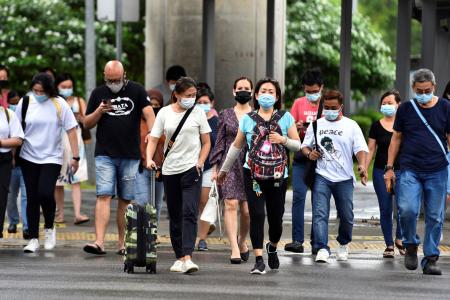More Covid-19 measures could be eased on July 12
Country transitioning to new normal, but masks are here to stay for a long time
Covid-19 measures could next be relaxed on July 12 as part of Singapore's graduated reopening that could potentially see it transitioning to a new normal.
"Come July 12, we are looking at opening up to (allow) more people dining together, and whether there are other steps that we can consider," Health Minister Ong Ye Kung told The Straits Times' senior health correspondent Salma Khalik in an exclusive interview yesterday.
The further easing this month would depend less on vaccination rates and more on whether Covid-19 clusters are under control, he said.
The next milestone for relaxing curbs will be in the second half of this month, when half of the country's population would have been fully vaccinated, followed by National Day on Aug 9, when two-thirds of residents would have been inoculated.
The step after that would see Singapore transition to the new normal of living with endemic Covid-19, Mr Ong added.
"You want the transition to be a... step-by-step one where you progressively move towards it, as opposed to a sudden change," said the minister, who co-chairs the multi-ministry task force tackling Covid-19.
Mr Ong said he shares Singaporeans' aspirations for leisure travel to resume by the end of the year. Possible destinations would be countries with high vaccination rates that are seeing their infections dip.
Asked if end-August or early September would be a good time to switch gears to the new normal - given that all eligible residents who want the jab would have been inoculated - Mr Ong said this was a realistic timeframe, but there will be no "big bang opening".
The multi-ministry task force announced on June 24 that Singapore will eventually transition to a new normal where Covid-19 will be managed like other endemic diseases.
Testing still remains important during the transition, said Mr Ong, who added that 37 per cent of the population is now fully vaccinated. About 59 per cent are partially vaccinated.
There were also other key considerations that nudged Singapore to move towards living with endemic Covid-19, though the decision to take that route was made on the basis of science, he added.
After an extended period of restrictions, there is a certain sense of battle weariness among people. "You cannot expect people to live like that - restricting themselves, not meeting friends, not being able to travel," he said.
Other major considerations include the trajectory of the pandemic, as well as the development of the vaccines and treatments Singapore now has at its disposal that could make living with endemic Covid-19 a possibility.
But masks are here to stay for a long time, Mr Ong said. "Masks, to me, is a very important non-pharmaceutical intervention, and may well be one of the last things we want to consider removing."
FOR MORE, READ THE STRAITS TIMES
Get The New Paper on your phone with the free TNP app. Download from the Apple App Store or Google Play Store now


